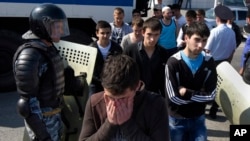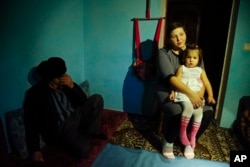Human rights concerns are growing over the deteriorating situation of tens of thousands of Tatars since Russia annexed the Crimean Peninsula, considered part of Ukraine, two years ago.
“Since April 2014, Crimean Tatars have been subjected to arbitrary searches, seizure of books and arrests. Allegations of ill-treatment have largely gone unaddressed by the de facto [Russian] authorities,” said Rupert Colville, spokesman for the U.N. High Commissioner for Human Rights.
Over the past two years, the U.N. human rights office has documented many cases of persecution of Crimean Tatars, including the intimidation, harassment and jailing of members of the Mejlis, the representative body of the Crimean Tatar minority community.
The U.N. agency has reported arbitrary arrests, such as those that occurred early last month when 35 men, mostly Crimean Tatars, were taken without due process to a police center and interrogated on alleged links with an extremist organization before being released.
The agency also has accused Russian-backed authorities of trampling the rights of freedom of expression, noting the shutdown of Crimean Tatar media outlets, such as last week’s reported blocking of Radio Free Europe/Radio Liberty’s Crimea news website.
History repeating itself
This growing pattern of abuse is playing out as a sinister backdrop to the May 18 anniversary of the 1944 deportation of some 200,000 Tatars from Crimea during World War II.
Colville told VOA the deteriorating situation of the Tatars in Crimea is “particularly sad, I think, given the great difficulty there was in re-integrating them after more than 50 years in exile."
He said, “There was an immense effort to resolve this huge historical injustice. So, it is very sad to see, to some extent, history repeating itself with the Crimean Tatars again being placed in a very, very difficult position.”
Soviet dictator Joseph Stalin had more than three million people forcibly uprooted and rounded up between 1936 and 1952, including eight entire ethnic groups that were removed from their ancestral homelands.
Among them were some 200,000 Tatars, who were branded as traitors and collaborators. They “were all deported — virtually all of them in the space of two days, on cattle trains,” said Colville. “Thousands died on the way to Central Asia. They were just dumped in various countries in Central Asia.”
Rendered stateless
Most of the Tatars were sent to then Soviet Uzbekistan. They were stripped of all rights of citizenship and became stateless.
The U.N. refugee agency estimates at least 10 million people around the world have no nationality. UNHCR spokesman William Spindler said they have become stateless through no fault of their own.
“It is a terrible situation to be in because it means you have no government that defends your interests, that protects your rights.”
Spindler told VOA that stateless people have no documents. That means they cannot send their children to school, they cannot get married, they cannot travel or work legally.
“Basically, all the things that we take for granted, even the exercise of your political rights to vote, are out of the question for stateless people because they do not have a state, a country, that they can call their own.”
He said, “This situation affects millions of people around the world. It has huge practical implications for people and it leaves them in a state of limbo.”
Back in a state of limbo
In 1999, less than a decade after the collapse of the Soviet Union, the Tatars were permitted to return to Crimea, their original homeland. With the help of the UNHCR, other organizations and political leaders, many of the Tatars had been able to acquire Ukrainian citizenship.
But, human rights spokesman Colville noted many Tatars fear that their status could, once again, change for the worse under Russian rule.
”The Crimean Tatars are in some ways, not quite the same way — but they are living in a state of limbo again because they do not know what is going to happen. What has happened with regard to the Russian Federation and the Ukraine is not of their choosing,” he said.
”There are more and more arrests of Crimean Tatars. So, you know obviously they are very concerned that they are in an extremely vulnerable position and we are concerned they are in a very vulnerable position as well.”
The U.N. High Commissioner for Human Rights, Zeid Ra’ad al-Hussein, has raised the issue of the Tatars with Russian officials. He is calling on the Russian Federation, which exercises de facto control over the territory of Crimea, to see to it that the rights of Tatars and other minority and indigenous peoples are respected. He also urged an end to the discrimination and harassment to which the groups are subjected.






